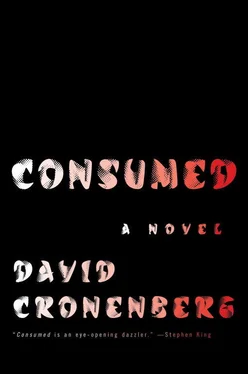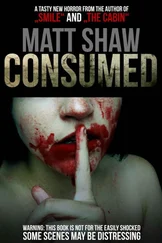“Has anyone done an autopsy on Célestine’s brain to see if she had a tumor?”
“Based on the diagnosis of a cleaning lady? I doubt it.”
“Are you aware of the report that Célestine’s severed head was cut open and that her brain was removed by her murderer or murderers? Why do you think they did that?”
A smile was still there on Dr. Trinh’s face, but it was no longer the same smile. It had become a smile that said, “I knew you were my enemy when you walked in here, and now here is the proof, and it makes me happy to see how right I was.” Dr. Trinh stood up and with special force brushed some more crumbs from the front of her suit, this time very dirty, greasy, ugly crumbs that had been sprinkled by Naomi herself. The little silver crucifix—had Vietnam been converted by French Catholic missionaries?—bounced at the end of its chain like a freshly hanged man. And still Naomi couldn’t help herself. “Dr. Trinh, off the record, did Célestine ask you to kill her and then eat her? As a kind of womanly, compassionate sacrament, perhaps?”
Dr. Trinh came out from behind her desk for the first time and walked to the door. She opened it for Naomi without a word. Naomi noticed the doctor’s shoes. They were stilettos with an ankle-strapped bondage component, very severe in their stitching and their shape, but shockingly colorful—red, yellow, blue, green, black—like rare Australian parakeets. As Naomi left the office, she could not help thinking that Dr. Trinh’s shoes were somehow significant.
DR. MOLNÁR HAD ARRANGED for him to be upgraded to elite business class—the Duna Club Lounge!—on his Malév flight to Amsterdam. Even so, Nathan found himself wandering restlessly through the generic steel and glass of Terminal 2A at Ferihegy Airport. Unlike Naomi, who would immediately bury herself in her laptop the instant she arrived, Nathan considered airport downtime an opportunity for people-watching; but today, a drizzly, chilly summer day whose gloom seemed to have seeped into the airport, the only person Nathan was watching was Dunja, who was playing continuously on a screen in his mind. Trailing his roll-on camera bag behind him like a little red wagon, Nathan heard her say the terrifying, outrageous things she said she couldn’t help thinking but had no one to say them to until she met Nathan.
“What will I do when you leave me? Who will want me?”
“I’m not so special. If I want you… You’re gorgeous. You’ll have as many lovers as you want.”
“So many women have cancer now. Do you think a new esthetic can develop? Cancer beauty? I mean, if there could be heroin chic, the esthetic of the death-wishing drug addict? Will non-cancerous women be begging their cosmetic surgeons to give them fake node implants under their chins and around their necks? Under their arms? In their groins? So sexy, that fullness. And it works so well as an anti-aging technique, to fill out that sagging turkey neck. Who wouldn’t want it? And the jewelry, the titanium pellets piercing those tits. So S&M/bondage.” Dunja kept talking in Nathan’s head as he segued into a parallel inner dialogue with her about health and evolution, about the theory that concepts of beauty were not just concepts, but perceptions of indicators of reproductive potential and therefore of youth, about selfish genes using our bodies as vehicles only to perpetuate themselves, about how perhaps cancer genes could begin to make their own case for reproductive immortality as well, and so they too would put immense pressure on cultural acceptance of formerly taboo concepts of beauty, concepts which used to indicate disease and nearness to death but now mesmerized and seduced and mimicked youth and ripeness and health, and so her little fantasy of a culture forming around her own dire straits could theoretically… It wasn’t a conversation they actually had, but if he were Naomi, he’d probably be texting or emailing or instant-messaging Dunja right now using that Naomiesque stream-ofsemi-consciousness that had flowed over him so often in the four years they had been together.
Naomi never let anybody go, and she used her unique, potent mixture of technology and witchiness to do it, whereas Nathan was only too happy to disconnect, to remove you from his Friends list and leave you dangling in the ether of cyberspace. Naomi thought that Nathan was ruthless with his friends; Nathan thought Naomi was compulsively, obsessively possessive. But what was Dunja? Despite the sex and the intimacy, she was the subject of a piece, and his subjects often tried to keep up a correspondence with him, sometimes clinging, with an unhealthy, creepy desperation, to that special moment in their lives; they couldn’t accept that their time was up, that the piece about their arcane, provocative medical condition had been published, and that Nathan was now permanently out of their lives. Naomi’s subjects usually ended up behind bars or executed, and that neatly limited flowback, as Nathan called it. Of course, Dunja was certain she would be dead in a few months, and that would neatly limit flowback as well.
Their last conversation had taken place in the Molnár Clinic’s horrid recovery room, after her breasts had been duly cut open and many small tumors had been removed under the cold blue surgery lights that transformed her flesh into silicone and her blood into magenta paste. He sat on the same plastic chair, although this time she was in the bed by the door and there were three other patients rustling and moaning in the room.
“Did you enjoy that?” she asked. “It made it easier knowing that I had an appreciative audience.”
“Molnár seemed confident of success. I enjoyed that part of it,” said Nathan.
Dunja laughed. “Molnár is just talking about the mechanics of tumor removal. That’s his success. He knows I’m not going to last long, but he doesn’t really consider it to be his problem.”
“Would it hurt for you to be more positive?”
“Oh, Nathan. It hurts when you become sentimental and ordinary. Why would you ever do that?”
“Ouch!”
“Did you get good pictures? Were they shocking? Will Molnár put them up on his wall to excite his customers eating their goulash? Should I make a pun about ghoulash? Ghoul lash?”
“I get it, I get it,” said Nathan, still stung, unable to smile. If she did recover, what would they talk about? Her dream of going back to architecture school at the University of Ljubljana and building luxury houses on the banks of the Sava with her father? How ordinary and sentimental would that be? “I got some very good shots of your operation. I’m not sure that you’ll like them, but I’ll email them to you if you want me to.”
Dunja took his hands in hers and pulled him towards the bed. He tried to lurch his chair forward, but it was too flimsy, bending and twisting until it popped out from under him, leaving him standing in a half-crouch like a jockey. She laughed again, and he took a step and settled on the bed, the lowered metal side rail digging into his thighs no matter how he shifted his weight. “Did it turn you on when Zoltán cut into my breasts? I almost convinced him to give me just a local anesthetic, but he copped out.” Nathan enjoyed Dunja’s sporadic sixties drug/rock lingo and wanted to ask her exactly who she learned her English from, but it never was the right moment.
“Dunja, I’m not a sadist. I’m not a bondage freak. It really brought me down to see you getting cut up.” Dunja became quiet, still. What he had just said, his expression of sexual normality, was not what she wanted to hear; he knew she would take it as rejection. He spoke very gently, skating on perversely thin ice. “When you recover from this, when you’ve healed completely, you’ll still be incredibly attractive to me. I mean, your disease and your treatment are not what make you sexy and beautiful.”
Читать дальше
Конец ознакомительного отрывка
Купить книгу







![David Jagusson - Fesselspiele mit Meister David [Hardcore BDSM]](/books/486693/david-jagusson-fesselspiele-mit-meister-david-har-thumb.webp)




